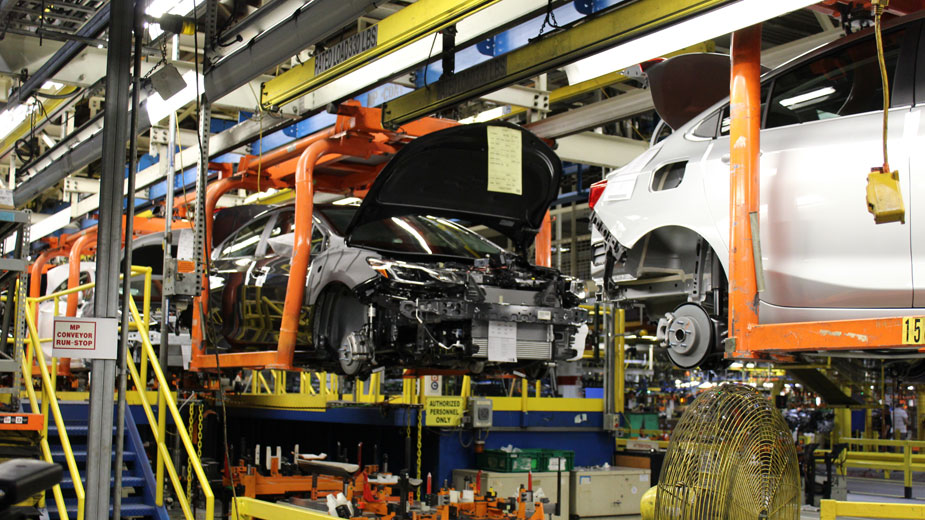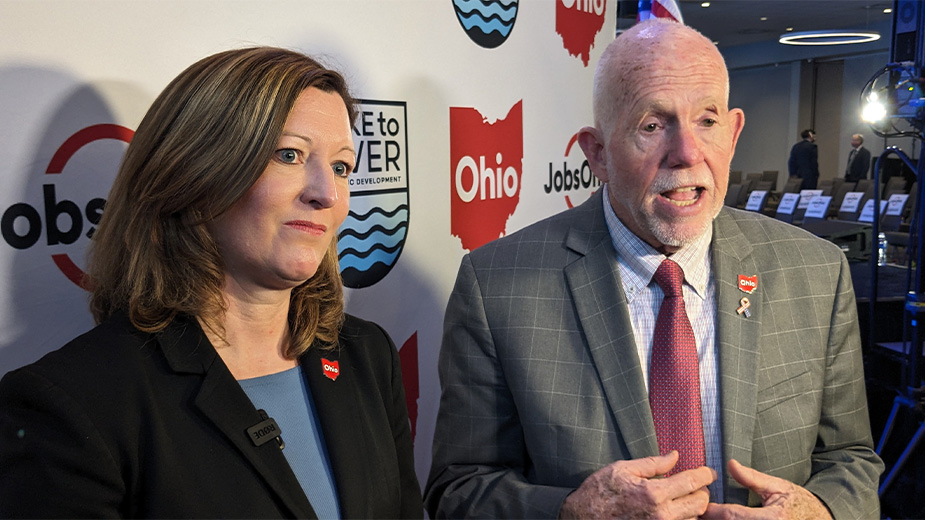GM Should Pay Something for Closing Lordstown: Brown, Portman, Ryan Say
YOUNGSTOWN, Ohio – Monday’s story published by The Business Journal and ProPublica revealing Ohio’s intent to claw back millions in public subsidies from General Motors elicited a mostly unified chorus from officials: GM should at least pay something as a consequence for closing its Lordstown Assembly plant last year.
“After its workers drove the success of the company for years and made the Lordstown plant one of the most efficient in the world, GM turned its back on Lordstown workers and walked away from the Valley,” U.S. Sen. Sherrod Brown, D-Ohio, said in statement Tuesday. “We shouldn’t reward that betrayal with tax incentives.”
“The state should claw back these tax incentives,” Brown said, especially since GM is building vehicles such as the Chevrolet Blazer in Mexico. He called on Congress to pass legislation he’s sponsored that would remove federal tax incentives that “reward companies like GM for abandoning communities like Lordstown and shipping jobs overseas.”
U.S. Sen. Rob Portman, on a conference call with reporters Tuesday morning, said he also supports Ohio’s efforts to collect from GM.
“They should be paid back when people pull up stakes and leave and don’t make their commitment,” said Portman, R-Ohio. “I know the state‘s been negotiating with GM for really the past several months.”
Portman was disappointed that GM elected not to award a new vehicle to the Lordstown plant after it halted production of the Chevrolet Cruze there. He also “strongly encouraged” GM to invest in Lordstown Motors Corp., the electric vehicle startup that GM sold the plant to and loaned the company $40 million. “I can tell you that that was not something that was in the cards early on,” he said.
The Business Journal and ProPublica reported Monday that in March, the Ohio Department of Development Services Agency sent a notice of non-compliance to GM stating it would recommend to the Ohio Tax Credit Authority that it terminate two tax credit agreements and that the automaker refund all $60.3 million it received. The credits were awarded to GM when the company was retooling the Lordstown plant to produce the Chevrolet Cruze.
In exchange for these incentives, the company agreed to keep the Lordstown plant open at least until 2027.
GM announced in November 2018 that it would cease production of the Lordstown-built Chevrolet Cruze in March 2019 and placed the plant on “unallocated” status. The company officially closed the factory in November 2019 after settling an acrimonious strike with the United Auto Workers union. More than 1,500 employees lost their jobs. Earlier, more than 2,500 workers were placed on layoff because GM eliminated two other shifts at the plant in 2017 and 2018.
GM, however, replied to Development Services with a five-page letter in April contending that the state should forgive all or a substantial amount of the liability. The automaker cited the company’s $3.3 billion worth of investments in Ohio since 2009, market conditions that impacted production and sales of the Cruze, the economic downturn due to the coronavirus pandemic, and GM’s commitment to build a $2.3 billion battery cell manufacturing plant in Lordstown.
Portman said he was pleased that GM selected Lordstown for its new battery plant, a joint venture with LG Chem called Ultium. He said the project has “real promise for the future.”
Ultium will produce battery cells for the electric-vehicle market and is expected to employ about 1,100 workers.
But even that investment doesn’t absolve GM from its responsibilities, Portman said. “When you make a commitment you ought to make sure that you’ve honored it,” the senator declared.
Public-private partnerships and tax incentives are ways to encourage investments that benefit companies and communities, U.S. Rep. Tim Ryan, D-13 Ohio, said.
“This is done to grow businesses and bring jobs to the people in our communities,” he continued. “The company, the state and the local community are accountable to any agreements or covenants. Accountability and reciprocity with any such project agreements is critical to keeping the trust of taxpayers.”
Development Services spokesman Todd Walker noted that the agency has not yet provided an official recommendation to the Ohio Tax Credit Authority.
“The Tax Credit Authority will make the final determination on whether or not a refund of tax credits issued is required, and if so, how much,” he said. The matter, he said, would be addressed at a future tax authority meeting.
The next meeting is scheduled for July 27.
State Rep. Michele Lepore-Hagan, D-Youngstown, specified in a statement that any funds the state collects from GM should be returned to the Mahoning Valley.
“They [GM] left us in the dust and the dirt. If the state makes good on collecting these funds, they must come back here to the Valley,” she said. “These workers deserve the Ohio promise of better jobs, brighter futures and an economy that works for everyone.”
In January 2009, GM and the state signed a deal awarding the automaker a 75% job creation tax credit worth $14.2 million. In return, GM promised to add at least 200 jobs and continue operations at Lordstown until 2039. Another agreement gave GM a 75% job retention tax credit worth $46.1 million with the pledge that GM would maintain 3,700 jobs at Lordstown and produce vehicles there until 2027.
“They gave GM that money under the premise that they would stay in the Valley for 30 years,” said Tim O’Hara, president of United Auto Workers Local 1112, which once represented hourly workers at the Lordstown Complex. “I fully support what the state is trying to do.”
O’Hara disputes GM’s argument that market conditions and sagging demand for the Cruze precipitated Lordstown’s closure. “I don’t buy their market share excuse,” he said. “I talk to dealers all the time and they lament the fact that they don’t have that car to sell anymore.”
The union leader also said that while the addition of a battery manufacturing plant is positive, the facility would employ fewer workers who are paid a lower wage than Lordstown Assembly employees. “The state is more than within their rights to come after that money.”
State Sen. Sean O’Brien, D-32 Bazetta, said the administration has been in discussions on how much the state should take back. He doesn’t support GM repaying the entire $60 million it owes but believes the automaker should refund a portion.
While some in state government are arguing for the entire amount to be returned, “I don’t know if that’s feasible,” O’Brien cautioned.
He pointed to the new battery plant as a factor that needs to be considered. “They’re still having a huge investment here. We want to see that happen,” he said.
John Moliterno, executive director of the Western Reserve Port Authority, said state officials should be attentive to taxpayers’ interests but also assess any impact of clawbacks before making a determination.
“I certainly have no problem with the state as it moves into the future being careful with the inducements it passes out. They’re dealing with taxpayer dollars, as we are, so it’s important,” Moliterno said. “They have a responsibility to the people in the state of Ohio to be prudent with those dollars.”
He said the region is excited about the battery-plant venture, the electric vehicle startup Lordstown Motors, and the prospect of the Mahoning Valley as a hub for the modern automotive industry. “The future is electric vehicles and we’re excited to be a part of that.”
Lordstown Mayor Arno Hill agreed, and added that any decision regarding GM must be weighed carefully against the automaker’s existing and future investments in Ohio and Lordstown.
“To go after them for $60 million when they’ve committed to $2.3 billion, what’s the bigger issue?” he asked rhetorically.
Hill also said he doesn’t expect any potential clawback effort to have a chilling effect on future development. Indeed, GM’s commitment to the Valley in the aftermath of Lordstown is refreshing when compared to other firms that have received public money only to completely abandon the region.
“How many companies come in, accept funds, and they bail, never to be seen or heard from again?” Hill said.
Pictured at top: The former General Motors Lordstown plant was operating three shifts when these Chevy Cruzes rolled off the assembly line.
Copyright 2024 The Business Journal, Youngstown, Ohio.



